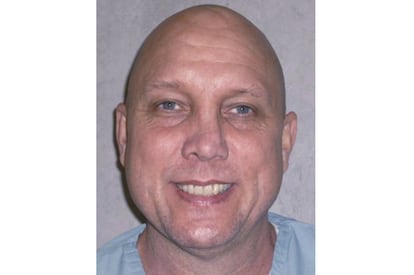Oklahoma executes man who claimed self-defense in a 2001 double killing
Republican Gov. Kevin Stitt declined to commute his sentence, despite a clemency recommendation from the state’s Pardon and Parole Board

Oklahoma executed a man Thursday who claimed he acted in self-defense when he shot and killed two men in Oklahoma City in 2001. Phillip Dean Hancock, 59, received a three-drug lethal injection at the Oklahoma State Penitentiary and was declared dead at 11:29 a.m. His execution went forward once Republican Gov. Kevin Stitt declined to commute his sentence, despite a clemency recommendation from the state’s Pardon and Parole Board.
“By unnecessarily stringing out his decision-making process for weeks, he has left the families of the victims in this case, all of Phil’s advocates and loved ones, the prison workers, and Phil himself, waiting for the news,” Abraham Bonowitz, executive director of the anti-death penalty group Death Penalty Action, said in a statement.
The Pardon and Parole Board narrowly voted 3-2 earlier this month to recommend that the governor grant clemency to Hancock. It was the fourth time the panel recommended that Stitt spare the life of a death row inmate. Officials began moving forward with execution preparations for Hancock once Stitt’s decision was made.
Stitt previously commuted the death sentence of Julius Jones in 2021 just hours before Jones was scheduled to receive a lethal injection. The governor rejected clemency recommendations for two other death row inmates, Bigler Stouffer and James Coddington, both of whom were later executed.
A spokeswoman for Stitt said the governor had planned to interview prosecutors, defense attorneys and the victims’ families before making a decision.
“It is sad that Governor Stitt has everyone on pins and needles about this,” Abraham Bonowitz, executive director of the anti-death penalty group Death Penalty Action, said in a statement. “By unnecessarily stringing out his decision-making process for weeks, he has left the families of the victims in this case, all of Phil’s advocates and loved ones, the prison workers, and Phil himself, waiting for the news.”
Hancock has long claimed he shot and killed Robert Jett Jr., 37, and James Lynch, 58, in self-defense after the two men attacked him inside Jett’s home in south Oklahoma City. Hancock’s attorneys claimed at a clemency hearing this month that Jett and Lynch were members of outlaw motorcycle gangs and that Jett lured Hancock, who was unarmed, to Jett’s home. A female witness said Jett ordered Hancock to get inside a large cage before swinging a metal bar at him. After Jett and Lynch attacked him, Hancock managed to take Jett’s pistol from him and shoot them both.
“Please understand the awful situation I found myself in,” Hancock told members of the Pardon and Parole Board via a video feed from the penitentiary. “I have no doubt they would have killed me. They forced me to fight for my life.”
Hancock’s lawyers also have said his trial attorneys have acknowledged they were struggling with substance abuse during the case and failed to present important evidence.
But attorneys for the state argued Hancock gave shifting accounts of what exactly happened and that his testimony didn’t align with the physical evidence.
Assistant Attorney General Joshua Lockett also said that a witness testified that after Hancock shot Jett inside the house, Hancock followed Jett into the backyard. There, the witness said, a wounded Jett said: “I’m going to die.” Hancock responded, “Yes, you are,” before shooting him again, Lockett said. “Chasing someone down, telling them you are about to kill them and then doing it is not self-defense,” Lockett said.
Jett’s brother, Ryan Jett, was among several family members who testified and urged the panel not to recommend clemency. “I don’t claim that my brother was an angel by any means, but he didn’t deserve to die in the backyard like a dog,” Ryan Jett said.
Hancock also was convicted of first-degree manslaughter in a separate shooting in 1982 in which he also claimed self-defense. He served less than three years of a four-year sentence in that case.
Hancock is the fourth Oklahoma inmate to be executed this year and the 11th since Oklahoma resumed executions in October 2021 following a nearly six-year hiatus resulting from problems with lethal injections in 2014 and 2015. Oklahoma has executed more inmates per capita than any other state since the 1976 reinstatement of the death penalty.
The next execution scheduled in Oklahoma is James Ryder on Feb. 1. Ryder was sentenced to death for the 1999 killing of Daisy Hallum, 70, and to life without parole for killing her son, Sam Hallum, 38, in Pittsburg County.
Sign up for our weekly newsletter to get more English-language news coverage from EL PAÍS USA Edition
Tu suscripción se está usando en otro dispositivo
¿Quieres añadir otro usuario a tu suscripción?
Si continúas leyendo en este dispositivo, no se podrá leer en el otro.
FlechaTu suscripción se está usando en otro dispositivo y solo puedes acceder a EL PAÍS desde un dispositivo a la vez.
Si quieres compartir tu cuenta, cambia tu suscripción a la modalidad Premium, así podrás añadir otro usuario. Cada uno accederá con su propia cuenta de email, lo que os permitirá personalizar vuestra experiencia en EL PAÍS.
¿Tienes una suscripción de empresa? Accede aquí para contratar más cuentas.
En el caso de no saber quién está usando tu cuenta, te recomendamos cambiar tu contraseña aquí.
Si decides continuar compartiendo tu cuenta, este mensaje se mostrará en tu dispositivo y en el de la otra persona que está usando tu cuenta de forma indefinida, afectando a tu experiencia de lectura. Puedes consultar aquí los términos y condiciones de la suscripción digital.








































